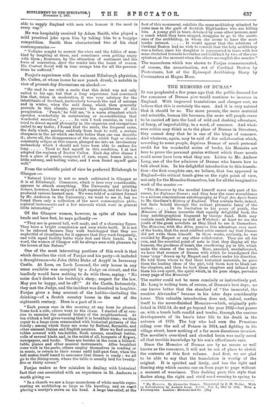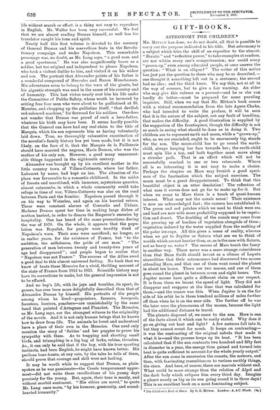THE MEMOIRS OF DUMAS.*
IT was prophesied a few years ago that the public demand for the romances of Dumas lol,,re would continue to increase in England. With improved translations and cheaper cost, we believe that this is certainly the case. And it is very natural that it should be so. The more prosaic, the more material and scientific, human life becomes, the more will people crave to be carried off into the land of wild and dashing adventure, of fancy, of improbability, in a word, of romance. And what- ever critics may think as to the place of Dumas in literature,
they cannot deny that he is one of the kings of romance. And whatever, again, may be said of the collaboration which, according to some people, deprives Dumas of much personal credit for his wonderful series of books, his Memoirs are here to prove the personal genius without which those novels could never have been what they are. Listen to Mr. Andrew Lang, one of the few admirers of Dumas who knows how to talk about him. In his delightful introduction to this transla- tion—the first complete one, we believe, that has appeared in England—his critical touch gives us the right point of view, not only for the Memoirs themselves, but for all the imaginative work of the master :—
" The Memoires by the novelist himself cover only part of his career, Les Enfances Dumas ; and they bear the same resemblance to a serious conscientious autobiography as Vingt Ans Apres bears to Mr. Gardiner's History of England. They contain facts, indeed, but facts beheld through the radiant prismatic fancy of the author In its limitation to his years of youth, the Memoires of Dumas resemble- that equally delightful book, the long autobiographical fragment by George Sand. Both may contain much Dichtung as well as Wahrheit : at least we see the youth of the great novelists as they liked to see it themselves. The Memoires, with Mes Bites, possess this advantage over most of the books, that the most crabbed critic cannot say that Dumas did not write them himself. In these works, certainly, he was unaided by Magnet or any other collaborator. They are all his own, and the essential point of note is that they display all the humour, the goodness of heart, the overflowing joy in life, which make the charm of the novels. Here, unmixed, unadulterated, we have that essence of Dumas with which he transfigured the tame 'copy' drawn up by Magnet and others under his direction. He told them where to find their historical materials, he gave them the leading ideas of the plot, told them how to block out the chapters, and then he took these chapters and infused into them his own spirit, the spirit which, in its pure shape, pervades every page of the Memoires."
The matter could not be more concisely or instructively put. Mr. Lang is writing here, of course, of Dumas's best days; no one knows better that the standard of "the immortal, the creative Alexandre" became in his later days considerably
lower. This valuable introduction does not, indeed, confine itself to the never-finished Memoirs—which, originally pub- lished in 1852-54, do not go beyond the year 1832—but passes on, with a touch both candid and tender, through the curious developments of its hero's later life to his death in the autumn of 1870. The boy who bad seen the Prussians riding over the soil of France in 1814, and fighting in his village street, knew nothing of a far more disastrous invasion. The novelist's over-tired and clouded brain was easily saved all that terrible knowledge by his son's affectionate care. Since the Memoirs of Dumas are by no means so well known as the romances, it will not be out of place to sketch the contents of this first volume. And first, we are glad to be able to say that the translation is worthy of the original. It is spirited and lively, and Las the light and dancing step which carries one on from page to page without a moment of weariness. This dashing pace, this style that flashes along, the right and vivid word seeming to spring to
• My Memoirs. By Alexandre Dumas. Translated by E. M. Waller. With an Introduction by Andrew Lang. 6 vols. Vol. I., 1802 to 1821. With • Frontispiece. London : Methuen and Co. Os.]
life without search or effort, is a thing not easy to reproduce in English. Mr. Waller has been very successful. We feel that we are almost reading Dumas himself, so well has his translator caught his tone and spirit.
. Nearly half this first volume is devoted to the memory of General Dumas and his marvellous feats in the Revolu- tionary compaign and under Napoleon. This remarkable personage was, no doubt, as Mr. Lang says, "a good man and a good sportsman." He was also magnificently brave as a soldier, but too original and independent to please Napoleon, who took a violent dislike to him, and visited it on his widow and son. The portrait that Alexandre paints of his father is a wonderful compound of Hercules and Baron Muncha.usen. His adventures seem to belong to the wars of the giants, but his gigantic strength was used in the cause of his country and of humanity. This last virtue nearly cost him his life under the Committee of Public Safety, whose wrath he incurred by setting free four men who were about to be guillotined at St. Maurice, and chopping up the guillotine itself, "that devilish red-coloured machine," for firewood for his soldiers. One does not wonder that Dumas was proud of such a hero-father, whatever his birth may have been. It seems hardly possible that the General can have had any real claim to the title of Marquis, which his son represents him as having voluntarily laid down. True, no thoroughly exhaustive examination of the novelist's family history has yet been made, but it is not likely, on the face of it, that the Marquis de la Pailleterie should have married the negress, Marie Dumas, who was the mother of his only son. However, a good many unaccount- able things happened in the eighteenth century.
Alexandre was brought up by his excellent mother in the little country town of Villers-Cotterets, where her father, Labouret by name, had kept an inn. The situation of the place was favourable to a romantic childhood. In the midst of forests and marshland, with immense, mysterious quarries, almost catacombs, in which a whole community could take refuge in time of war, Villers-Cotterets was also on the road between Paris and the frontier. Napoleon passed through it on his way to Waterloo, and again on his hurried return.
There were constant alarms of Cossacks and Uhlans. Madame Dumas spent her time in making large dishes of mutton haricot, in order to disarm the Emperor's enemies by hospitality. One has heard of the same precautions during the war of 1870. On the whole, it appears that the popu- lation was Royalist, for people were terribly tired of Napoleon's ware. Their sons were sacrificed; no longer, as in earlier years, for the existence of France, but "to the ambition, the selfishness, the pride of one man." "The generation of men between twenty and twenty-two years of age had disappeared"; and people began to realise that "Napoleon was not France." The success of the Allies owed a good deal to this almost universal feeling. No book that we know of beats these Memoirs for a vivid, thrilling account of the state of France from 1812 to 1815. Scientific history may have its corrections to make, but the general impression is not to be effaced.
And no boy's life, with its joys and troubles, its sport, its games, has ever been more delightfully described than that of Alexandre Dumas by himself. His portraits of the people among whom he lived—proprietors, farmers, bourgeois, foresters, bunters, poachers—are unmistakably by the same band that painted d'Artagnan and Planchet. The Memoirs, as Mr. Lang says, are the strongest witness to the originality of the novels. And it is not only human beings that he knows how to draw from life. The animals be loved and understood have a place of their own in the Memoirs. One need only mention the story of ' Sabine ' and her puppies to prove his sympathy with them. As to trapping and shooting small birds, and triumphing in a big bag of larks, robins, thrushes, &c., it can only be said that if the boy, with his true sporting instincts, had been English, he might have known better. His Perilous boar-hunts, at any rate, by the tales he tells of them, should prove that courage and skill were not lacking.
It may be worth while to suggest that Dumas, as plain- spoken as he was passionate—the Creole temperament upper- most—did not write these recollections of his young days precisely for the young. But, again, their tone is manly, and without morbid sentiment. "His ethics are saved," to quote Mr. Lang once more, "by his humour, generosity, and sound- hearted humanity."































































 Previous page
Previous page